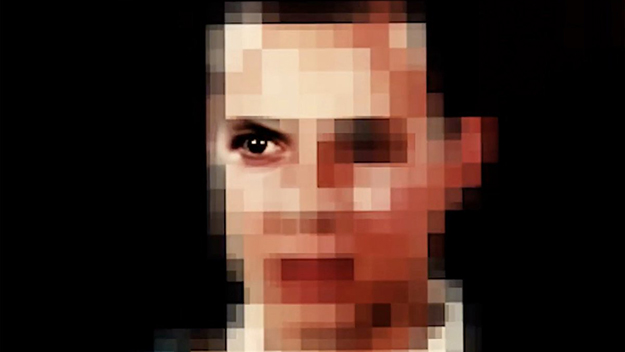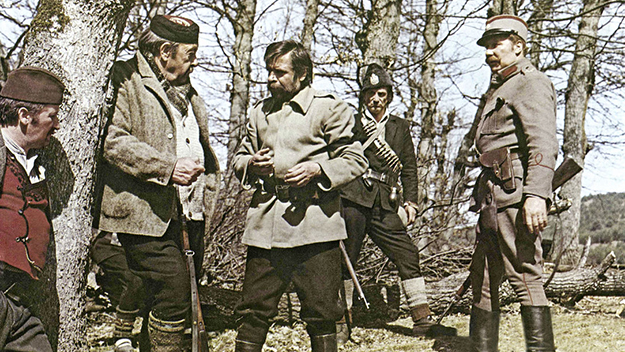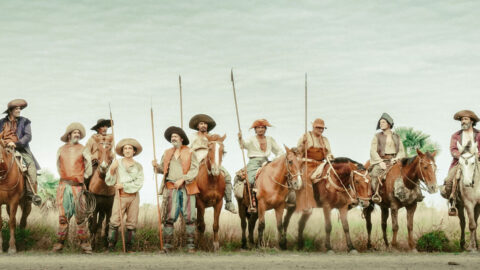Dispatch: Viennale 2019

AI (Lucrecia Martel, 2019)
Every year, the Viennale commissions a trailer from a bona fide filmmaker, and the 2019 edition brought about a doozy: Lucrecia Martel’s AI, a haunting pixelated détournement of a mid-century film documenting a psychiatric patient. The ability to garner a short from Martel—whose 2017 feature Zama sits atop Film Comment’s Best of the Decade list, by the way—speaks to the position of respect and goodwill that the festival occupies. (Past trailer-machers include Apichatpong Weerasethakul, Agnès Varda, David Lynch, and Jean-Luc Godard.) So it’s been a great disappointment that I have not been able to attend the Viennale for years, stymied for one reason or another. The stars finally aligned this time, and I was able not only to make the trip but to join a stimulating panel discussion with an international array of fellow critics and editors absolutely dedicated to their craft.
And as 2019 drew to a close, with the usual year-end horse-race rituals that narrow down popular focus, the fall visit to the Viennale stood out as a highlight of my moviegoing. The latest edition continued its insightful mélange of programming, selecting both highlights and overlooked titles from Cannes and Locarno and beyond, and curating retrospectives and director spotlights in a genuine spirit of discovery. The extensive retrospective strand, alongside the wide-ranging contemporary selections, reliably lend different and rewarding depths to the Viennale (which concluded its second year under the leadership of artistic director Eva Sangiorgi). The festival is a vital and distinctive curator of film culture at a time when every such bastion feels not just valuable but essential.
Along those lines, the retrospective “O Partigiano! Pan-European Partisan Film” stood out as a formidable accomplishment—an ambitious, challenging, and eye-opening survey of a little-screened category of post–World War II cinema that grapples with fractious postwar allegiances and wrenching struggles for survival. I can count my visit a success just by having gone to a 35mm screening of Hajka (1977), from prolific writer and Black Wave filmmaker Zivojin Pavlovic. Set in Montenegro, it’s the grimmest kind of war movie, mired in the aftermath of the larger conflict when a cruel and volatile mix of lawlessness and martial rule hold sway. In the illusion-free scenario adapted from Mihailo Lalic’s novel, a ragtag squad of partisan soldiers flees the occupying Italians and collaborators, going so far as to hide in a cave, but their already meager numbers dwindle as they’re picked off. Hajka had been described to me as attaining some as-yet unachieved form of realism—a claim that sounded extravagant but began to feel truer and truer in the fearlessness of its vision, steeped in menace and despair (of a sort which loomed over Miklos Jancso’s very different but analogous Silence and Cry when I happened to watch it later).

Hajka (Zivojin Pavlovic, 1977)
Death by gunshot in Hajka happens quickly, curtly, and looks distinctly un-cinematic, at least by the standards absorbed from decades of bodies dropping on screen. In other words, it’s quite an antidote to the award-courting likes of one current imagining of battle, 1917, as Pavlovic convincingly stages what internecine warfare in and around a rural community might feel like. From the looks of this possibly unique print, as beaten-up as its subjects, Hajka would need a restoration in order to reach the broader audiences it richly deserves. I also sampled another retrospective, for Peter Brook—the foundational stage director whose 1960s films Lord of the Flies and Marat/Sade left their anarchic brand upon my young brain in early viewings. The title I caught was a well-preserved slice of reverent mysticism, Meetings with Remarkable Men, in a director’s cut (shorter but still featuring Terence Stamp); Brook was ultimately unable to attend, though a production of Don Pasquale directed by Irina Brook, his daughter, was apparently underway at Vienna’s Staatoper.
Wimpily enough, a stubborn bug left me sidelined for much of my time at the Viennale and made my moviegoing choices a little unpredictable (as may already be apparent). But Argentine filmmaker Gustavo Fontán’s La Deuda (The Debt), centered on a bridge-burning clerk who must return a hefty wad of cash to her employer, had a cool asceticism that was notable. And I can’t omit shout-outs to two more programs, on Italy’s Cecilia Mangini and on Angela Schanelec, the latter of whom I later had the pleasure of interviewing for Film Comment’s January/February “Inspired” feature, delving into the process behind conceiving her plainly wondrous I Was at Home But… (an NYFF selection). All of which still leaves much more that I wish circumstances had allowed me to see on the big screen, but then, it’s that very feeling of wishing you’d seen more, which confirms the enduring value of a festival.




